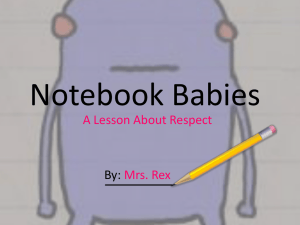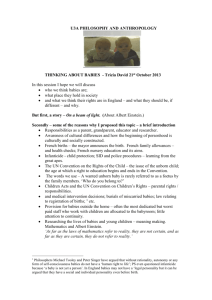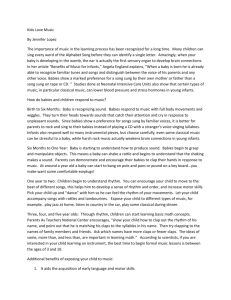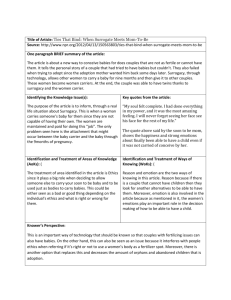Child development-Early stages Through Age 12
advertisement
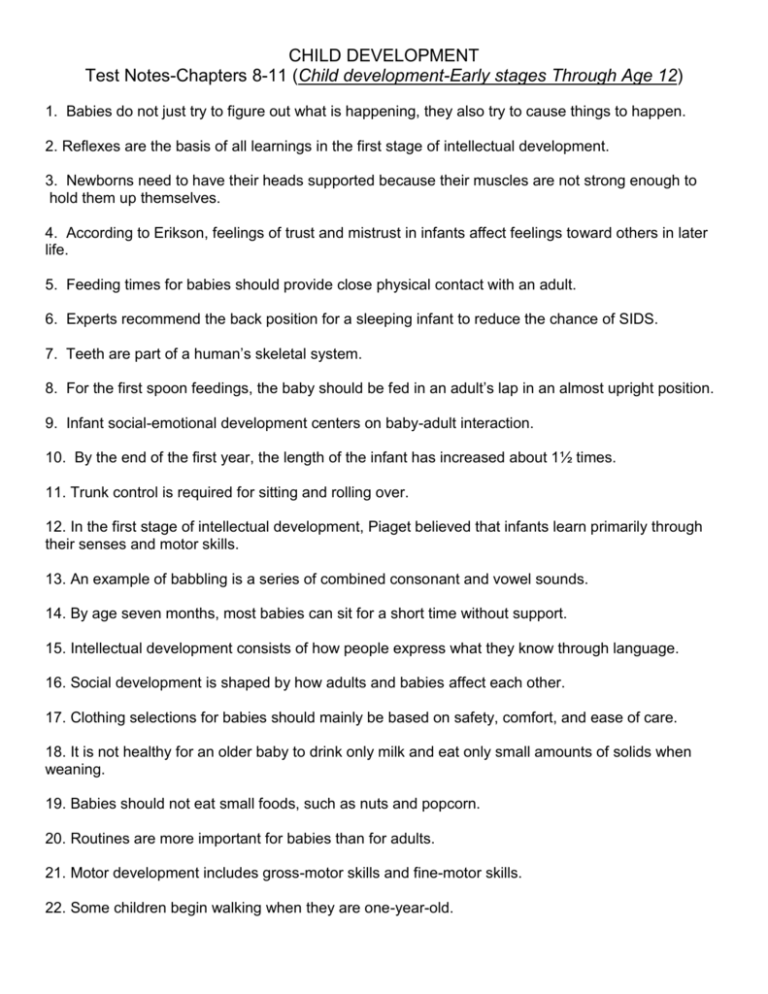
CHILD DEVELOPMENT Test Notes-Chapters 8-11 (Child development-Early stages Through Age 12) 1. Babies do not just try to figure out what is happening, they also try to cause things to happen. 2. Reflexes are the basis of all learnings in the first stage of intellectual development. 3. Newborns need to have their heads supported because their muscles are not strong enough to hold them up themselves. 4. According to Erikson, feelings of trust and mistrust in infants affect feelings toward others in later life. 5. Feeding times for babies should provide close physical contact with an adult. 6. Experts recommend the back position for a sleeping infant to reduce the chance of SIDS. 7. Teeth are part of a human’s skeletal system. 8. For the first spoon feedings, the baby should be fed in an adult’s lap in an almost upright position. 9. Infant social-emotional development centers on baby-adult interaction. 10. By the end of the first year, the length of the infant has increased about 1½ times. 11. Trunk control is required for sitting and rolling over. 12. In the first stage of intellectual development, Piaget believed that infants learn primarily through their senses and motor skills. 13. An example of babbling is a series of combined consonant and vowel sounds. 14. By age seven months, most babies can sit for a short time without support. 15. Intellectual development consists of how people express what they know through language. 16. Social development is shaped by how adults and babies affect each other. 17. Clothing selections for babies should mainly be based on safety, comfort, and ease of care. 18. It is not healthy for an older baby to drink only milk and eat only small amounts of solids when weaning. 19. Babies should not eat small foods, such as nuts and popcorn. 20. Routines are more important for babies than for adults. 21. Motor development includes gross-motor skills and fine-motor skills. 22. Some children begin walking when they are one-year-old. 23. Weaning should be done gradually because the baby must learn a new way to drink. 24. Infants may “talk” through cooing and crying. 25. Babies come into the world using all their sense organs and react to stimuli with certain reflexes. 26. If two people share an identical environment, their concepts of that environment would not also be identical. 27. Babies with slow-to-warm-up temperaments take longer to adapt than babies with easy temperaments. 28. Babies, unlike older children and adults, depend on others to meet all their physical needs. 29. Motor development includes the infant’s ability to walk. 30. Crawling before walking is an example of head-to-foot development. 31. Concepts change from concrete to abstract. 32. Piaget states the sensorimotor stage begins at birth and most children complete it in two years. 33. A baby smiling is the attachment behavior that appears first in a baby’s life. 34. Using a firm mattress in the baby’s bed does not increase the risk of SIDS. 35. Adults who have good relationships with babies respect babies’ temperaments. 36. The fact that babies grow slowly and rooms need not be planned for easy changes as babies grow are not points to bear in mind when choosing play spaces for babies. 37. Creeping and crawling are names for different skills. 38. Infants do not look like miniature adults. Their body proportions differ from those of adults. 39. Within the first year, infants have highly developed sense organs and motor skills, and they use these to learn about people, objects, and places in their world. 40. Babies should be fed on demand rather than on a set schedule. 41. Before babies are a year old, they can see a connection between what they do and what happens. 42. When place on the stomach, babies can lift the head before they can lift the head and chest. 43. When babies are ready for solids, parents should introduce one food at a time. 44. By the end of the first year, the weight of the infant has tripled. 45. Infancy is the period of life between two weeks and one year after birth. 46. Vygotsky believed that adults should help children within their zone of proximal development (ZPD). 47.Temperament joined with a person’s environment shapes personality most. 48. A baby cannot digest complex nutrients found in solids, starting solids too early may cause allergy problems, and some solids have too much sodium are reasons for avoiding solids during the first six months. 49. Both new and repeated experiences are necessary for learning. 50. The first stage of Piaget’s cognitive development is called the sensorimotor stage. 51. Babies change their seeing, hearing, and touching preferences as they try to learn about the world. 52. A baby’s trust is built by meeting a baby’s needs at all times. 53. Adults need to watch for signs of food intolerance in babies. 54. The age at which babies sleep through the night may vary widely from baby to baby. 55. It is normal for the first tooth to be present at birth, appear during the first year, or appear after the first birthday. 56. The baby develops from head to toe, motor skills develop from general to specific and develops from center to outward to the extremities are all patterns of motor development. 57. Fine-motor development means using the hands. 58. Attachment behaviors include trying to stay close to the adult, smiling, crying, or calling and developing in a certain order. Essay question: Provide complete responses to the question or statement. Describe three different temperaments common to babies.



